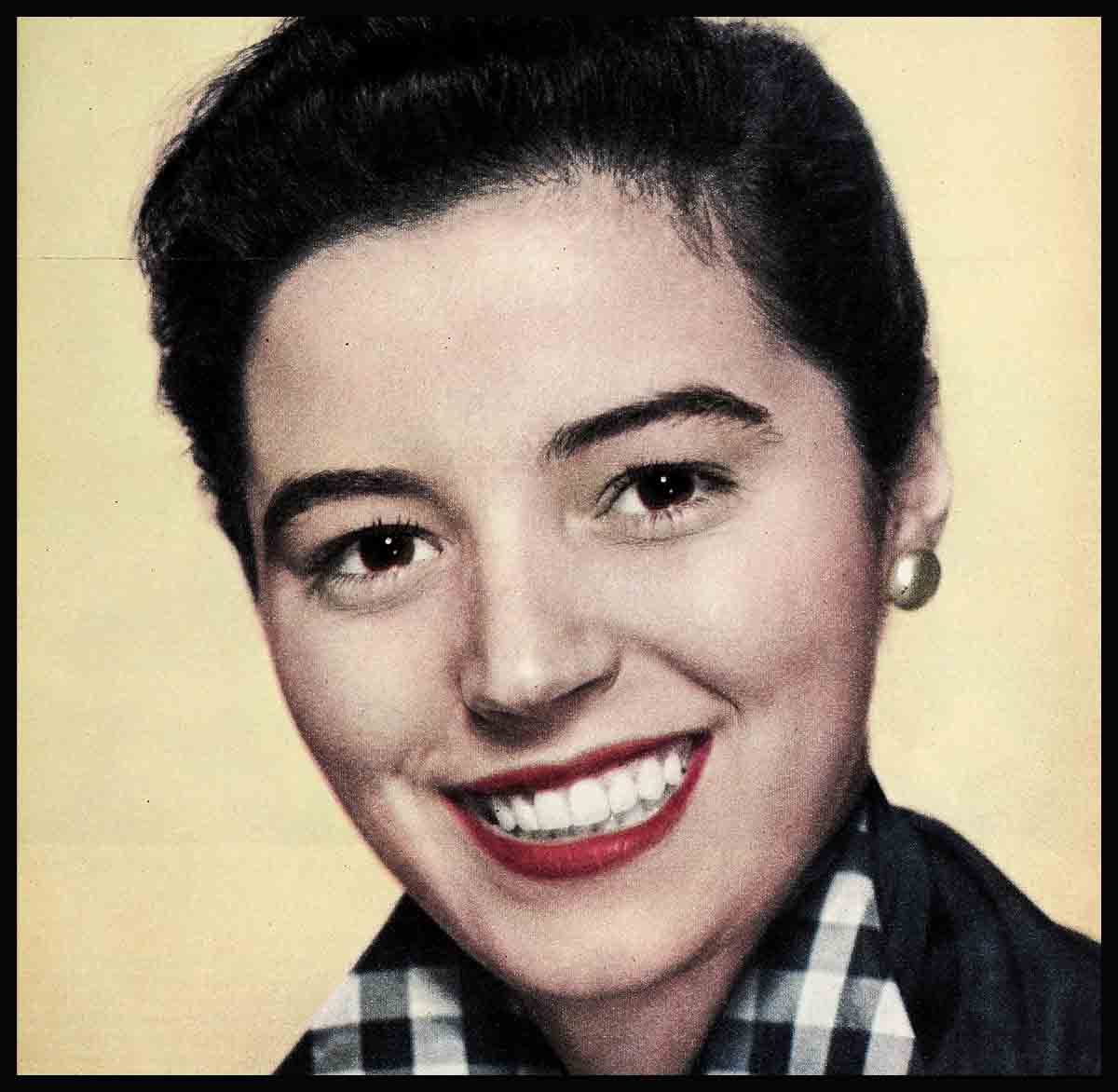
Imported Glamour Italian Style—Marisa Pavan
Marisa Pavan (pronounced Mah-REE-sah Pah-VAHN) was born Marisa Pierangeli, twenty minutes after her twin sister, Anna, on the island of Sardinia on June 19, 1932. She has a haunting dark beauty, large round brown eyes, brown-black hair and an elfin, mobile face. She is five feet two, weighs 108 pounds and, besides talent, has a mysterious excitement of spirit that fascinates people. Totaled together. Hollywood predicts these statistics add up to sure stardom.
While Marisa’s career tumbled off to a slower start than her twin Pier’s, it’s not exactly news in Hollywood that Marisa is catching up: Maybe, say some—sticking their necks out—she will even surpass Pier. For Marisa, as she has grown older, shows signs of depth and maturity that can take her on to important, serious, character roles.
“The Rose Tattoo” should be her big movie break. Playing the daughter of Italy’s great actress, Anna Magnani, offers her a chance to really act. To give you an idea what to expect, when the picture was completed, Magnani had only one thing to say, about Marisa: “She’ll be one of the top actresses of tomorrow.” Paramount saw her potential, too. They nabbed her for the role of the beautiful Catherine de Médicis in “Diane.”
Serious, hard-working and dedicated to her work, Marisa confesses, “I really wanted to be, since five, a ballerina.”
This was a secret yearning, shared for a long time only with her twin Pier. In their childhood days in Italy, lying together in their great bed at night, they exchanged confidences. Pier was not deeply interested in ballet, she confided; she wanted to become an actress, a tragedienne like Italy’s immortal Eleonora Duse.
It was always like that with the twin sisters. They were separate personalities with divergent interests. Because they are fraternal twins, they look no more alike than the usual pair of sisters and, as time passed, they found that many of their tastes (even in boys) differed.
Whispering at night, they compared notes. Pier said, “Of course, I would want to marry someday and have a family.”
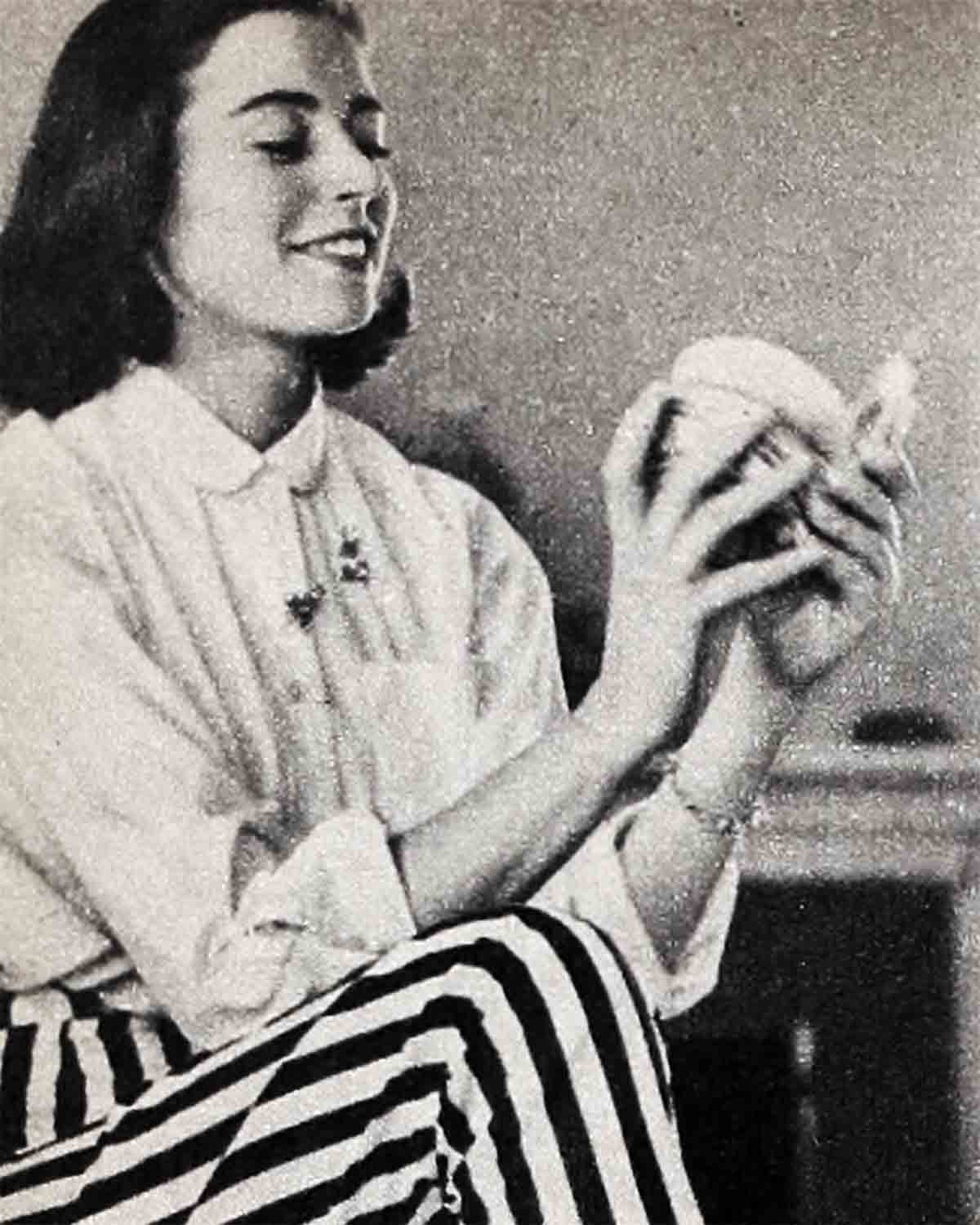
Marisa insisted, “I may never marry. If I could become a ballerina nothing else would matter much.”
Mrs. Pierangeli, recognizing the extent of Marisa’s talent and the intensity of her ambition, made arrangements for her to take ballet lessons. After the first few periods of instruction, the ballet teacher spoke breathlessly to Mrs. Pierangeli, “Your child is so gifted, she has the greatest natural instinct for ballet I have encountered in years.”
The praise meant only one thing to Marisa: Her dream might become reality. If what the dancing mistress said was true, Marisa would work even harder.
During all that wondrous month, Marisa moved on enchanted feet. Then her father learned about her lessons.
Mr. Pierangeli was head of the family in the protective, classical European tradition. During his own boyhood, the theatre and those who worked in it had been regarded askance by proper people of substantial family background. Repeatedly he had said, “Never will I permit a daughter of mine to have anything to do with the stage—not in any form.”
After a stormy scene, during which everyone wept, Marisa’s lessons were discontinued.
That night the twins conferred again. They would run away. They would save their allowances and their Christmas money, and they would slip away some night. Somehow, though, they never did.
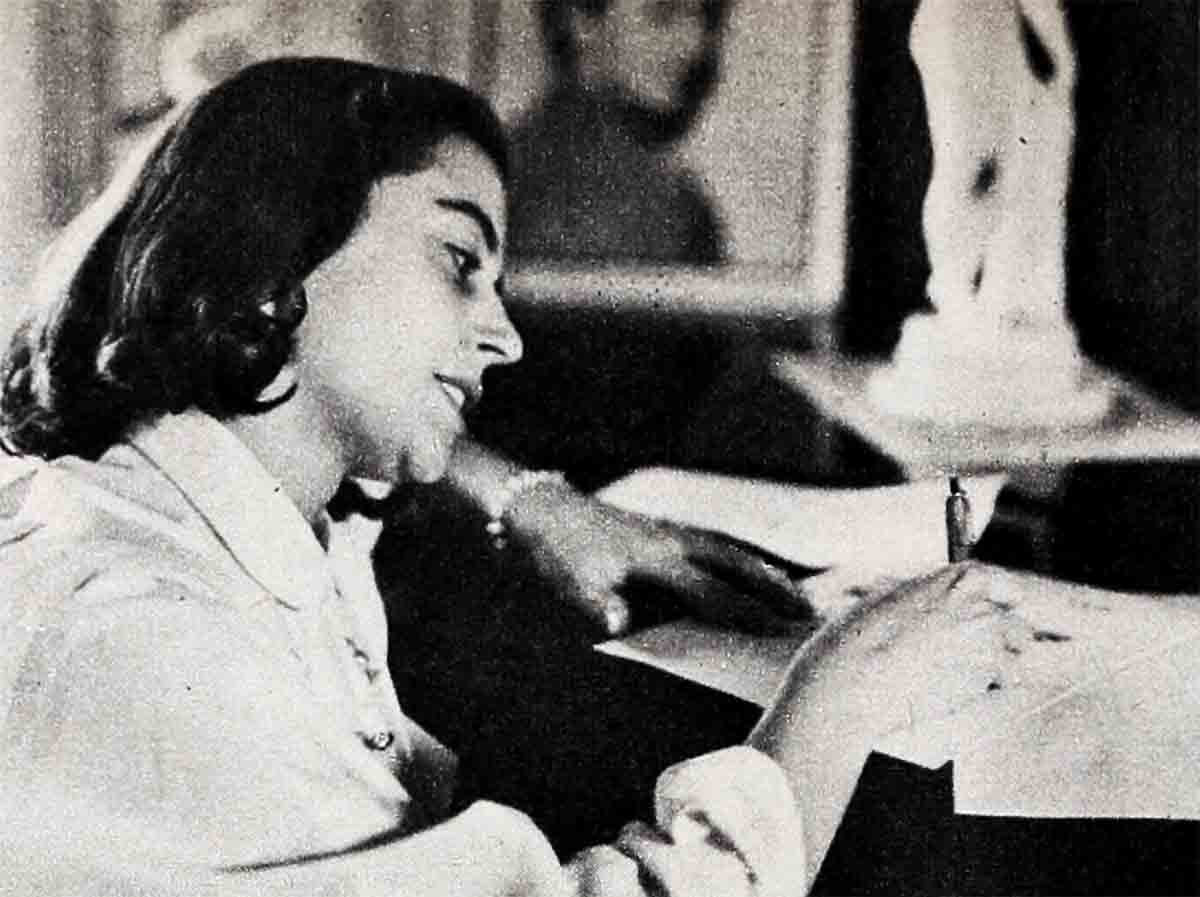
Marisa and Pier were seven when Hitler marched against Poland; they were fifteen when the postwar Italian film industry began to make its influence felt throughout the world. Pier was spotted on the street one day by a famous producer wanting a fresh young girl for a role in his new production. When the producer discussed the part with Pier, she explained that her father was totally opposed to acting as a career for his daughters. She must decline.
A few days later Pier was spied in an art gallery by director-actor Vittorio de Sica; he wanted her for the same film. After hearing her story about her straitlaced father, he called upon Mrs. Pierangeli.
Although understanding her husband’s bias, Mrs. Pierangeli had ambitions for her beautiful daughters. In the old prewar days her reactions might have been different, but she had lived through a war. Life, as Pierangeli reasoned, was difficult at best.
While they, as a family, had been remarkably fortunate, six years of war did not leave them unmarked. Marisa, for example, was unable to plan for the future. To this day, she holds tomorrow in suspicion.
She says quickly to her family, when some word is dropped about doing something a year from now, “Don’t talk about time far away. When the future comes, we meet the situation as it exists then.”
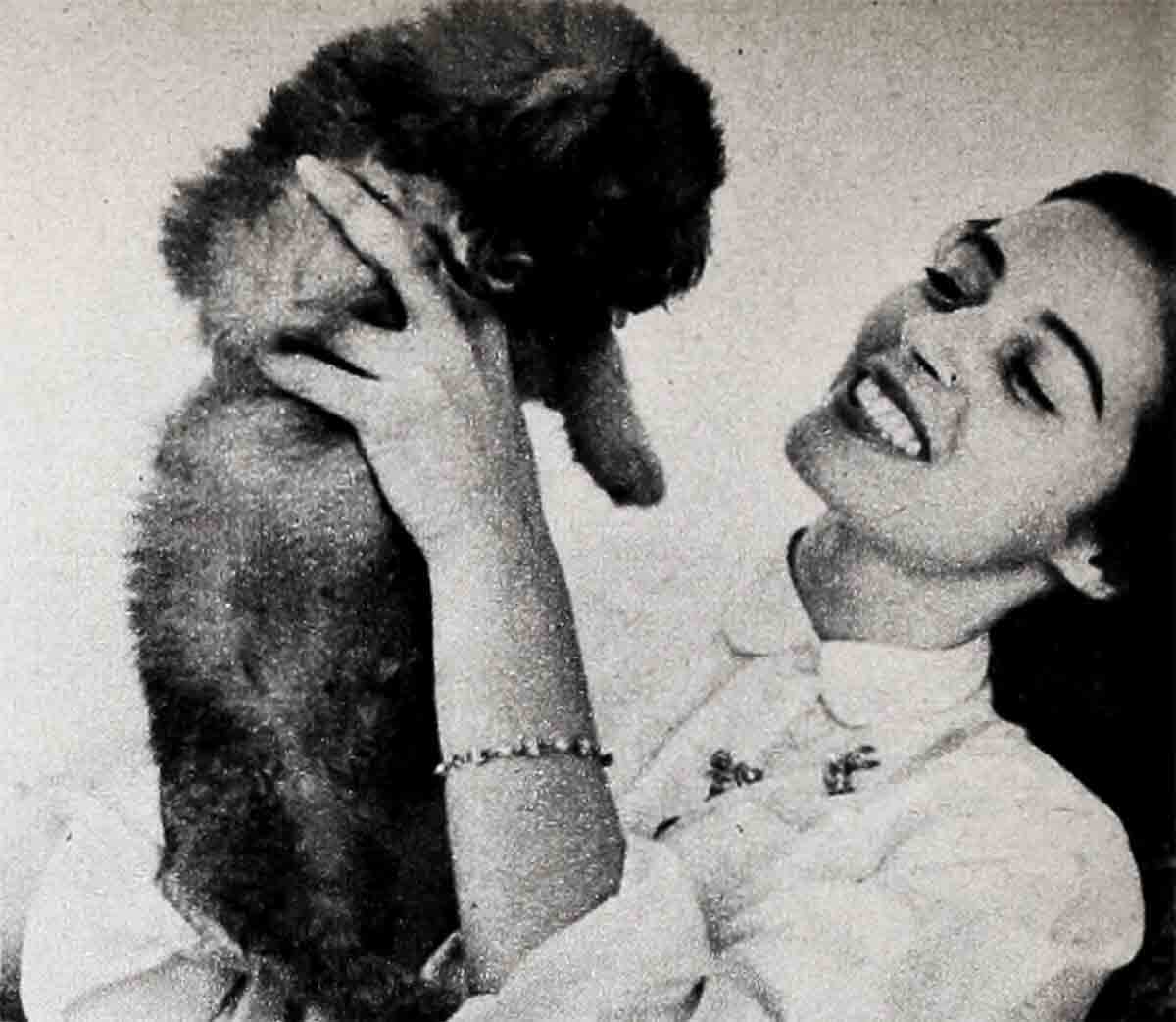
A child of war, thought Mrs. Pierangeli when she first observed Marisa’s mistrust of time to be. And, she thought, the theatre—whether live or on film—is a world of make-believe, infinitely kind to those it chooses as its own. Kind because it opens fresh vistas. Kind because its rewards are generous. Why not experiment?
The sisters, dressing for school in exchanged clothing because what belonged to one always belonged to the other, discussed the possibilities. “If I make a success as an actress, maybe I can find ways to get you a dance opportunity,” Pier assured Marisa.
“An actress and a ballerina in the family! If only Papa would not refuse,” Marisa prayed.
Mrs. Pierangeli said nothing to her husband about Pier’s studio visits until the deadline hour when, as legal guardian, he had to sign the film contract. By that time cameras were ready to roll; wardrobes were completed, rehearsals were done, all the preliminaries had been satisfied. To have refused to sign invited possible litigation.
Grumbling, Father Pierangeli signed with the proviso that Pier was to make one film. “Only one,” he warned.
But theatre-owners took one look at their first Pier Angeli film, noted the musical cascade of silver at the boxoffice and forever ended Mr. Pierangeli’s plan.
At this point, a tremendous change took place in the life of Marisa, but in reverse. Whereas Pier found herself in the midst of a vivid new existence, meeting exciting new people, learning fascinating new techniques, Marisa became the stay-at-home.
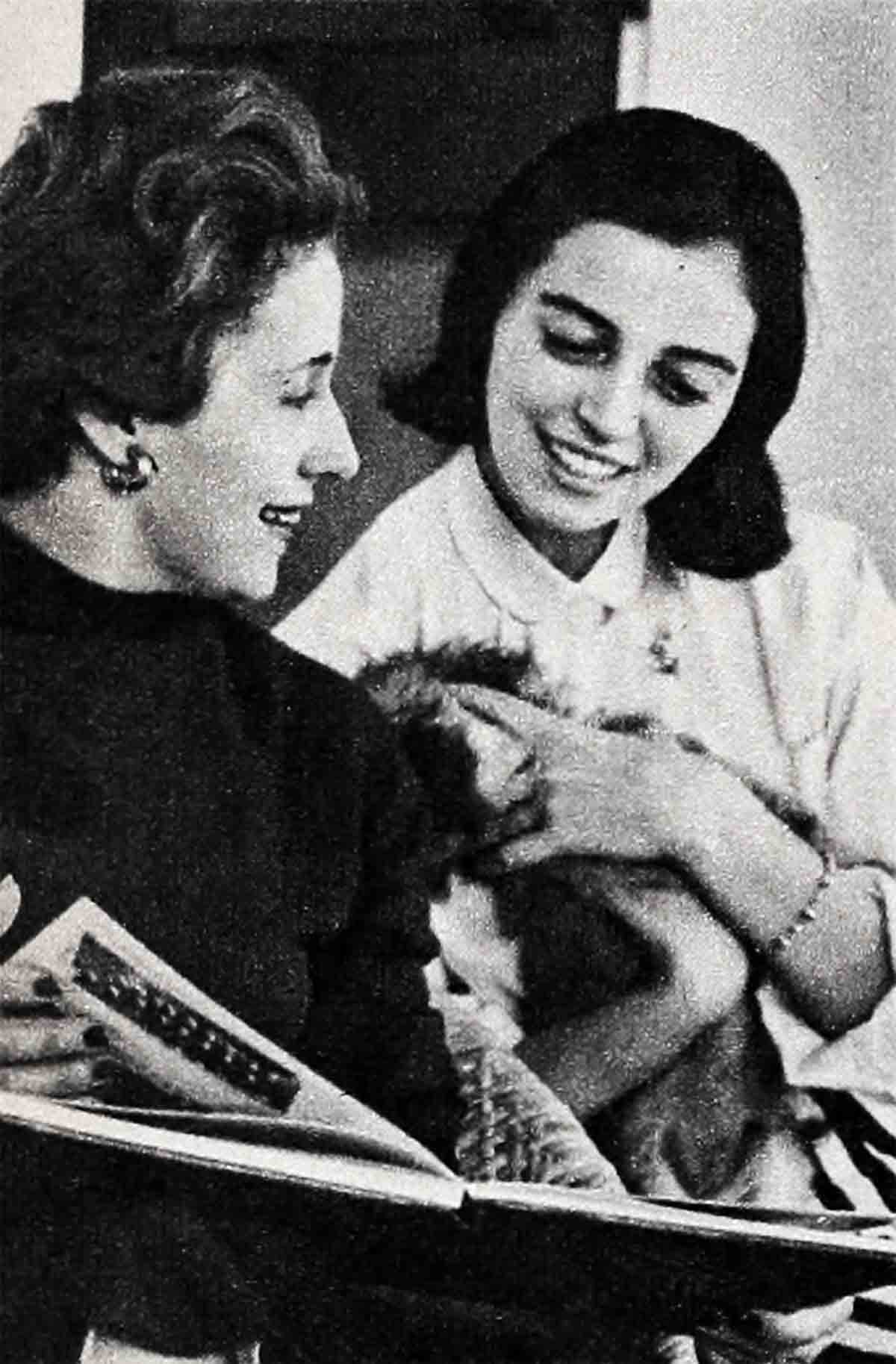
Mrs. Pierangeli had to remain on the set with Pier at all times, so it fell to Marisa’s lot to become baby sister Patrizia’s full-time chargé d’affaires. “Patrizia was not yet a year old,” Marisa explains. “She kept me always on the jump.”
Marisa had other responsibilities, too: sweeping and dusting the house, making the beds, washing dishes, ironing the frilly blouses that are so much a part of the Italian summertime, and preparing certain portions of the family dinner to simplify her mother’s task at the end of the studio day.
Marisa particularly remembers one day, blushing. It started with the tomato sauce ‘simmering on the back of the stove. Marisa—one eye on the baby contentedly kicking and rolling in her playpen—started one of those interminable telephone conversations which helped pass her day. There were rules about the telephone. Fifteen minutes per conversation; no call-back permitted in less than two hours.
But when there was no one around to enforce the rules and when the baby was good, Marisa could see no reason for inhibiting her social life. After all, since she had quit school to make Pier’s career possible, she had the average teenager’s conviction that the world owed her something in return, if only an active telephonic existence.
Her social life was yakking along nicely on this particular afternoon when she was interrupted by thunderous poundings on the front door. Neighbors arrived via the hack door. The fire department came screeching around the corner.
“Hold the wire one moment,” Marisa told her caller. “There must be trouble.”
Running to the kitchen, she found it filled with smoke and with neighbors wielding fire extinguishers. Soon came the firemen shouting questions. Eventually the blackened tomato sauce and the molten remains of the aluminum container were cleared away and the room was aired.
Marisa returned to the telephone, blasély announced, “I have had bad luck with our tomato sauce. I’ll talk tomorrow,” and set about, as best she could, to remove the evidence of her crime.
There is no point in going into the next scene. Mrs. Pierangeli said all the things the average American mother would have said, and the disapproval of Mr. Pierangeli was as black as that of any American father. “Doghouse for Marisa,” she laughs now.
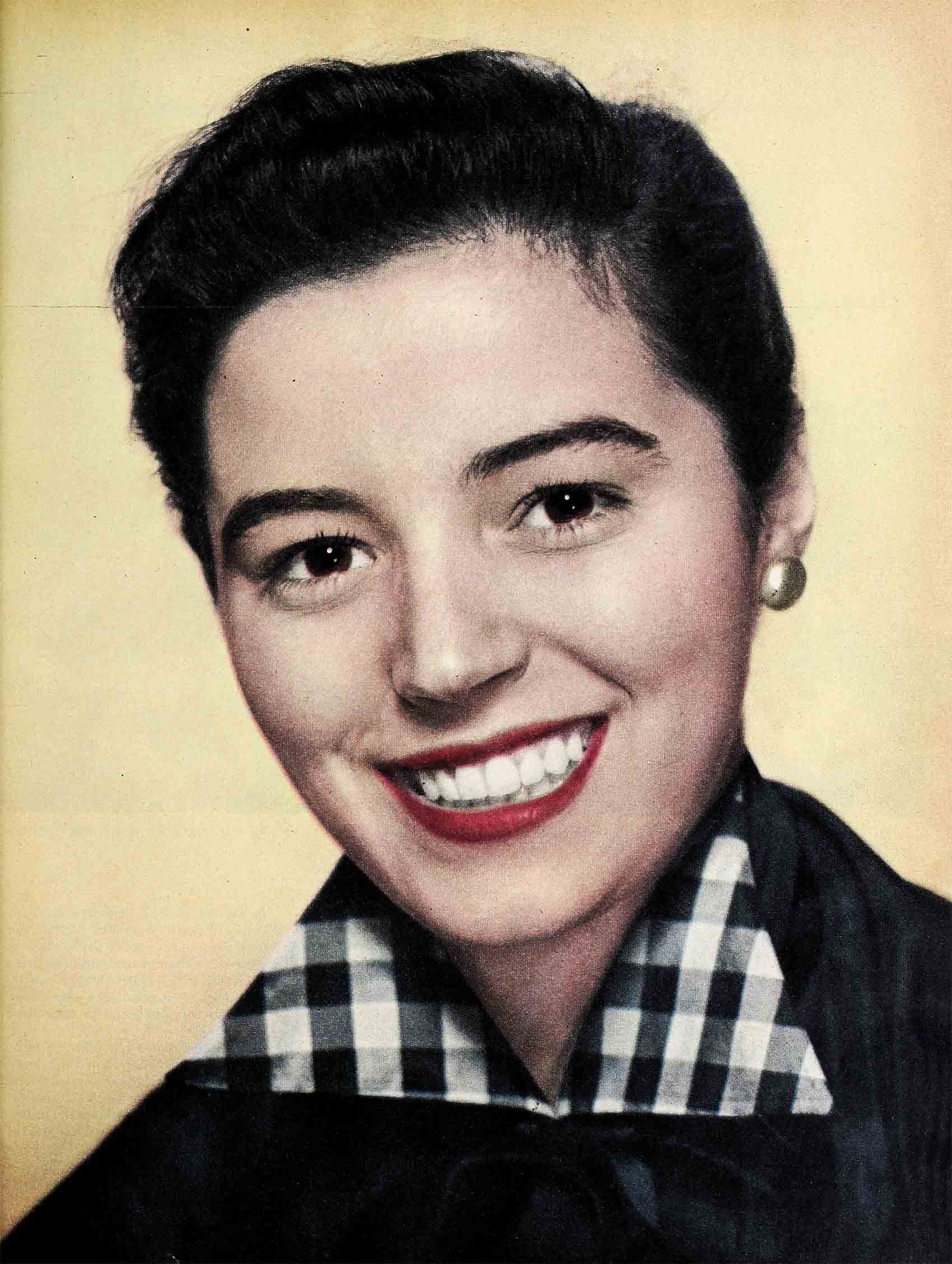
Often, with a fretful baby to tend, the ironing to do and dinner to prepare, Marisa shared her father’s disapproval of careers for women—other than ballerinas, of course. She felt her responsibilities unjust. Even so, though, she was tremendously proud of Pier and listened avidly to reports about the studio.
Long after their light was out at night, the two girls discussed scripts and acted the various roles Pier was working on. Pier was maturing rapidly, learning new arts and graces. But it was Marisa who had the first experience with blossoming love. One of the boys to whom she talked regularly on the telephone, punctuated his report on local happenings one afternoon with the abrupt declaration, “I love you, you know.”
For several moments Marisa was so startled that she could think of nothing at all to say except, “Oh?”
When silence persisted at the other end of the wire she asked, “Are you there?”
The boy said he was on the wire but that he considered “Oh?” a strange reply to a declaration of love. “What does it mean?”
Haltingly, Marisa tried to explain, just as millions of American girls in precisely the same spot have tried, that she liked him very much; perhaps she liked him better than other boys she knew. But she was not in love.
Still, the fact that she was beloved added flavor to her days. That one particular telephone call each afternoon was something to anticipate in the morning. something to discuss with Pier every night. Pier had so much to talk about; it was pleasant for Marisa to have at least one fascinating topic of conversation.
Happily enough, the boy was an imaginative beau. On one occasion he sent Marisa a recording of a Chopin waltz together with a note: “This is the way it is supposed to be played.” He had listened, during the long open-windowed hours of summer, to Marisa’s labored mutilation of the melody until he had been driven to constructive action.
On other occasions he sent books he thought Marisa would enjoy: the works of Voltaire, a Goethe collection, Steinbeck’s “Of Mice and Men,” and the poems of Garcia Lorca. As it turned out, these were the poems with which Marisa spent the gloomiest Christmas Eve of her life.
After the sudden death of Mr. Pierangeli, the family made it a habit to travel with Pier when she was signed to make a picture away from Rome. Mrs. Pierangeli, Pier, Marisa and Patrizia were living in a hotel suite in Paris while Pier was working in a French film, and there Christmas of 1951 found them.
The only traditional touch of Noel that the Pierangelis had the spirit to bring to their foreign quarters was a small Christmas tree for Patrizia. She found it enchanting, but the rest of the family could only note that the tinsel had tarnished in the damp French climate. How they ached for home and friends, the soft air and blue winter sky of Rome!
On Christmas Eve Pier was invited to attend an elegant party. Reasoning that she might as well be wretched while dancing instead of turning blue with homesickness in a hotel suite, she accepted the invitation.
Marisa and her mother tucked Patrizia into bed, then put a bottle of champagne on ice. “Several hours between now and time for the midnight toast,” Marisa said. “We might as well read.”
Marisa has never known what book occupied her mother’s time, but the pages she scanned—through her tears—were leaves in her precious volume of Garcia Lorca’s poems.
At midnight she and her mother met in the living room, poured their champagne, touched glasses and lifted a toast “To the health, happiness and prosperity of the Pierangelis.” Both had difficulty swallowing.
Certainly neither had any faintest notion that the next Christmas would be spent in Los Angeles, or that when someone should ask Marisa, teasingly, what she wanted for Christmas dinner she would reply, “A hot dog or a hamburger”—and mean it.
To this day she maintains that—like native born teenagers—she could live indefinitely on hot dogs, hamburgers and ice cream sodas.
However, Marisa’s first reaction to the U. S. was that, to look down at it from a hotel window. was exactly like watching the frantic activity of an ant heap. The traffic struck her as being the most appalling instance of pure frenzy she had ever seen. “I can’t watch,” she announced, turning her head away.
She would have scoffed had anyone told her someday she would negotiate Los Angeles boulevards with only an occasional shrill.
“My second American problem,” she says, “had to do with money.” Spending it, that is. For several weeks she represented a major threat to the entire financial structure of the Pierangelis. When a bellboy brought a flower arrangement to the hotel suite, Marisa expressed her appreciation with three one-dollar bills. (Paper money in Italy comes in a variety of small denominations.)
The bellboy who delivered the mail received a dollar bill and the delivery boy with the dry cleaning picked up two happy dollars.
“Stop,” a friend who witnessed one of these minor holdups told Marisa in horror. “No wonder you people are the most popular guests in the hotel.” He immediately explained the dollar system. Marisa now understands but confesses, “I still get confused about two bits.”
If American money confused her, American pronunciation caused complete bafflement. “American words are not pronounced as they are spelled,” she explains, still mystified. “They look exactly as you do not say it.
“When I first arrived in Hollywood, I wanted to buy a shirt. A white shirt. I ask to see a ‘tzirt.’
“The girl showed me a skirt; a tailored skirt. When I shook my head, she showed me a circle skirt.
“ ‘No-no. A blooz.’ I explained. The woman brought out several blue skirts. Finally, pinching the waist I wore beneath my suit jacket, I said, ‘Please, a tzirt. A blooz.’
“ ‘A blouse,’ she said clapping a hand to her forehead.
“Yes, please, a blouse,’ I sighed finally.”
Incidentally, one of Marisa’s hobbies is designing her own clothing. Whenever she sees a sleeve that she likes, on a friend or in a store window, she sketches it quickly, uses it in a future dress plan. Envious chums insist that Marisa’s talent is such that if she preferred she could become a top designer.
Another hobby is sketching attractive rooms in the homes she visits. Someday she wants to build a house; when the time comes she will have a portfolio of sketches from which to assemble the blueprints.
It doesn’t seem to be generally known that Pier and Marisa started their American careers at approximately the same time. Pier was placed under contract to M-G-M, but Marisa’s first role came in the remake of “What Price Glory?” in which she was directed by John Ford. He came to regard the sensitive, flexible young Roman with a father’s deep affection, and Marisa always refers to him as “Papa Ford.” It was he who advised Marisa against signing a contract with a major studio at once. “You have a special quality that will have to be carefully used in films,” he said. “Avoid molds. Don’t let yourself become a type—a fate almost unavoidable in many Hollywood situations.”
So she remained a free lance—difficult at first but now remarkably successful. (She worked in “Down Three Dark Streets”; was Alan Ladd’s love interest in “Drum Beat”; got top billing opposite Burt Lancaster in “The Rose Tattoo,’ and now a starring part in “Diane.”)
Marisa insists upon handling her own career plans despite an occasional problem with English. Recently, in conference with her attorney over a film commitment, Marisa was eager to let the barrister know how pleased she was by his efforts in her behalf. “It is easy to see that you are a very good liar,” she said, beaming on him.
His startled and instantly affronted expression warned her that her vocabulary had run amuck. “One moment,” she begged. “One moment—a misunderstanding with words. What have I said? Let me think.”
And then it dawned. “I did not mean ‘liar!’” she gasped. “I intend to lawyer.”
“No matter what anyone tells you,” the attorney said, recovering quickly, “the two words have quite different meanings.”
While learning to speak and to understand “American,” Marisa also learned to understand American boys. “They are more practical than European boys,” she says. “And more curious. Instead of paying compliments, they ask questions.”
As most fans remember, Marisa dated Vic Damone before Pier did, but there was never a romance between them. Arthur Loew, jr. was a steady caller for many months, but those who know Marisa are convinced that theirs was a friendship and nothing more. There are other beaux, too; young actors whose names are not yet known, and the upcoming young technicians around the studios.
Long ago Marisa wrote to the boy in Italy, explaining that it would be unfair to him for them to continue their correspondence. “He needed to be thinking of other things. He is in the Air Force—flying jets,” she says, shuddering. “I remember his name in my prayers because I know, in a small way, what his life must be like. I flew in a jet from Rome to London and back again last year, and I never want to take off in a jet again. Never. Perhaps I’m old-fashioned. I don’t care. That kind of flying is too terrible for the human body to endure. To be honest—I truly hate jets.”
What does she love?
Right up at the top of the list is her lusty young nephew, the son of Pier Angeli and Vic Damone. If Pier is the most devoted young mother in Hollywood at the moment, Marisa is the most devoted aunt. When she discovered that the only vacation she could take during 1955 would occur during the month of August when the baby was due, she shrugged and said, “Then—no vacation. I am not going to be anywhere in the world except here when that baby is born.”
So there you have Marisa: a self-styled “old-fashioned” girl who has ridden jet airliners; a practical girl who has passed out three-dollar tips; a marathon telephone conversationalist who dislikes cook ing; an independent girl who likes h own apartment but who spends most her free hours with the family she adores; a connoisseur brought up on wines and champagne who would rather have a chocolate malt any day—with hamburger.
We suggest you keep an eye on her. She’s going places.
THE END
—BY FREDDA DUDLEY BALLING
It is a quote. PHOTOPLAY MAGAZINE DECEMBER 1955





No Comments